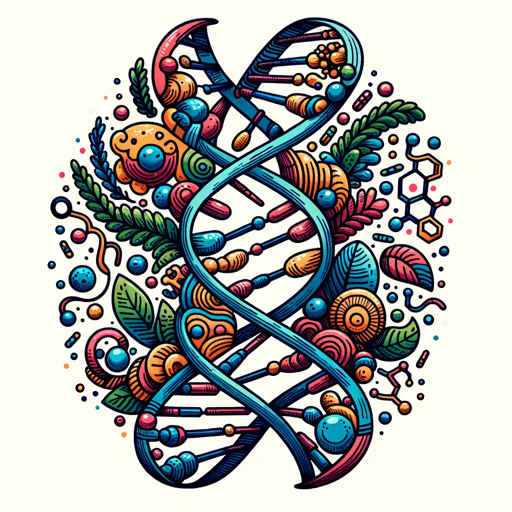Microbiology-AI Microbiology Assistance
AI-Powered Microbiology Solutions
Related Tools
Load More
Biology Bio
🔷#𝟏 𝐒𝐩𝐞𝐜𝐢𝐚𝐥𝐢𝐳𝐞𝐝 𝐄𝐱𝐩𝐞𝐫𝐭 𝐁𝐢𝐨𝐥𝐨𝐠𝐲 𝐓𝐮𝐭𝐨𝐫🔷

Biology Professor
Your biology expert

Biology Laboratory Expert (Protocol&Analysis)
Version: 2.0 (2024. 05. 28) Establishing and reviewing protocols for biological experiments. Designing animal models for research purposes. Conducting NGS and single-cell analysis using R and Python. * Add Code interpreter function

Human Anatomy - Physiology Instruction Specialist
A seasoned expert specializing in the education of human anatomy and physiology, dedicated to enhancing content creation and refinement for superior learning experiences."

Biology ExpertGPT All Levels
Expert in biology / Medicinal Biology aiding in study and research.

Cell Biology Guide
Your expert guide in cell biology.
20.0 / 5 (200 votes)
Introduction to Microbiology
Microbiology is the scientific study of microorganisms, a diverse group of microscopic entities that include bacteria, viruses, fungi, protozoa, and algae. The primary focus of microbiology is to understand the biology of these organisms, their interactions with each other and with their environments, and their roles in various ecological and industrial processes. Microbiologists work in various fields, including healthcare, environmental science, agriculture, and biotechnology, to explore how microorganisms can be harnessed for beneficial purposes or controlled to prevent harm. For example, in healthcare, microbiologists study pathogens to develop vaccines and antibiotics, while in environmental science, they investigate the role of microbes in bioremediation and nutrient cycling.

Main Functions of Microbiology
Disease Diagnosis and Treatment
Example
Identifying pathogenic bacteria in clinical samples to diagnose infections and determine the appropriate antibiotic treatment.
Scenario
A patient presents with symptoms of a bacterial infection. A microbiologist analyzes the patient's blood or tissue sample, identifies the specific pathogen causing the illness, and tests its susceptibility to various antibiotics to recommend the most effective treatment.
Biotechnology and Industrial Applications
Example
Using genetically engineered bacteria to produce insulin for diabetes treatment.
Scenario
A biotech company employs microbiologists to modify Escherichia coli bacteria to produce human insulin. These engineered bacteria are cultivated in large bioreactors, and the insulin they produce is purified and formulated for use by diabetic patients.
Environmental Monitoring and Bioremediation
Example
Applying microbial treatments to clean up oil spills in marine environments.
Scenario
Following an oil spill, environmental microbiologists assess the impacted area and introduce oil-degrading bacteria to accelerate the breakdown of hydrocarbons. They monitor the microbial activity and the reduction of oil pollutants over time to ensure effective remediation.
Ideal Users of Microbiology Services
Healthcare Professionals
Doctors, nurses, and clinical laboratory scientists rely on microbiology for accurate diagnosis and treatment of infectious diseases. Microbiology services provide critical information on pathogen identification, antibiotic resistance, and infection control, helping healthcare providers manage patient care effectively.
Biotechnologists and Pharmaceutical Researchers
Researchers in biotechnology and pharmaceuticals use microbiology to develop new medical treatments, vaccines, and diagnostic tools. They benefit from microbiology services by accessing expertise in microbial genetics, fermentation technology, and bioengineering, enabling the development of innovative products and therapies.

Guidelines for Using Microbiology
Step 1
Visit aichatonline.org for a free trial without login, also no need for ChatGPT Plus.
Step 2
Ensure you have a stable internet connection and a compatible browser for optimal performance.
Step 3
Identify your specific microbiology-related query or task, such as research, academic writing, or data analysis.
Step 4
Use the chat interface to input your questions or commands clearly and concisely.
Step 5
Review and apply the detailed responses and solutions provided to your microbiology tasks.
Try other advanced and practical GPTs
Universal Translator
AI-powered translations with regional flair.

AI StoryLord
AI-powered visual storytelling reimagined.

Chicago Citation Wizard
AI-powered citations made easy

Citation - MLA, APA, Chicago, and More
AI-powered precision in citations

Acedemic Assistance
AI-Powered Academic Writing Enhancement

Video∑✏️
AI-powered insights from YouTube videos.

10x Python Engineer
AI-powered Python programming guide.

Epic Fantasy Artisan
AI-powered fantasy art creation.

Legoset Converter
Transform images into custom LEGO sets with AI

GPT Architect
AI-Powered Creativity and Customization

Image to Video
Transform Images into Engaging Videos with AI

CHARACTERs GPT
AI-powered creativity at your fingertips.
- Data Analysis
- Problem Solving
- Research Assistance
- Literature Review
- Experiment Planning
Detailed Q&A about Microbiology
What kind of microbiology questions can I ask?
You can ask questions related to microbial physiology, genetic engineering, pathogen interactions, antibiotic resistance, and more. This tool provides comprehensive answers based on current microbiological knowledge.
How can this tool assist with academic writing in microbiology?
This tool can help generate detailed content, structure your research papers, provide references, and ensure scientific accuracy in your microbiology-related academic writing.
Can I use this tool for microbiology research data analysis?
Yes, the tool can assist with analyzing microbiological data, offering insights into experimental results, and suggesting potential hypotheses and further experiments.
Is there a limit to the number of queries I can make?
There is no specific limit on the number of queries. However, for more complex queries, breaking them down into smaller, manageable questions can yield more precise and detailed answers.
What prerequisites are needed to use this tool effectively?
A basic understanding of microbiology concepts and terminology is beneficial. Having a clear objective for your queries will help in obtaining the most relevant and useful responses.